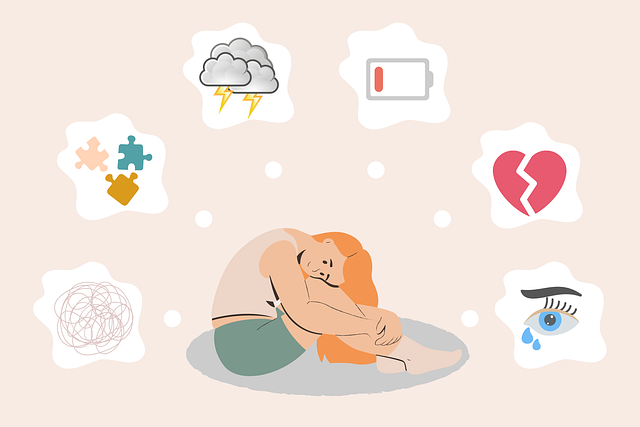Burnout among healthcare providers in Highlands Ranch is driven by demanding work conditions and personal issues like Oppositional Defiance Disorder (ODD), impacting patient care and the system. Access to mental health services, including tailored ODD therapy, self-care practices, and supportive environments, mitigates burnout. Proactive measures such as crisis intervention guidance, open conversations about mental health, and stress management programs are crucial for resilience. Specialized ODD therapy approaches enhance patient interactions and coping strategies, fostering a compassionate care environment and improving overall well-being.
“In the demanding landscape of healthcare, burnout among providers is a growing concern. This comprehensive guide explores effective strategies to prevent and address burnout in Highlands Ranch medical professionals. From understanding the all-encompassing nature of burnout to identifying specific risk factors unique to the region, we delve into practical solutions.
We highlight the importance of supportive work environments, self-care practices, and even specialized therapy approaches like ODD treatment for holistic recovery. Discover actionable steps to enhance well-being and resilience among healthcare providers.”
- Understanding Burnout Among Healthcare Providers
- Identifying Risk Factors for Burnout in Highlands Ranch
- Creating a Supportive Work Environment
- Implementing Effective Self-Care Practices
- Specialized Therapy Approaches for Burnout, Including Oppositional Defiance Disorder (ODD) Treatment
Understanding Burnout Among Healthcare Providers

Burnout among healthcare providers is a growing concern, especially given the demanding nature of their work. It goes beyond simple job dissatisfaction; burnout is characterized by emotional exhaustion, depersonalization, and reduced personal accomplishment. Healthcare professionals, often on the frontlines of patient care, may struggle to maintain their well-being due to long hours, high stress levels, and complex decision-making processes. This issue is particularly pertinent in areas like Highlands Ranch, where access to quality mental health services, including Oppositional Defiance Disorder (ODD) therapy, can significantly impact provider resilience.
The impact of burnout extends beyond the individual, affecting patient care and the overall healthcare system. A burned-out provider may exhibit increased irritability, reduced empathy, and decreased clinical effectiveness, potentially leading to poorer patient outcomes. Therefore, proactive measures are necessary to foster resilience building and self-care routine development for better mental health among these essential workers. Implementing strategies such as anxiety relief techniques, regular breaks, and access to support networks can help combat burnout and ensure healthcare providers in Highlands Ranch remain dedicated and effective in their crucial roles.
Identifying Risk Factors for Burnout in Highlands Ranch

In Highlands Ranch, identifying risk factors for burnout among healthcare providers is essential due to the unique challenges that come with providing care in a suburban setting. High-stress environments, long working hours, and limited resources can contribute significantly to burnout. Many healthcare workers in this area may also be dealing with personal issues, such as Oppositional Defiance Disorder (ODD), which can further exacerbate stress levels. Therefore, comprehensive strategies are needed to address these concerns.
Crisis Intervention Guidance and Mental Health Education Programs Design tailored for the Highlands Ranch community can play a pivotal role in burnout prevention. Encouraging open conversations about mental health and implementing Self-Esteem Improvement initiatives can help healthcare providers cope with stress. By fostering an environment that supports and educates, the risk of burnout can be mitigated, ensuring better patient care and overall well-being for healthcare professionals in this region.
Creating a Supportive Work Environment

In creating a supportive work environment for healthcare providers, particularly those dealing with complex cases like Oppositional Defiance Disorder (ODD) in Highlands Ranch, it’s essential to prioritize communication strategies that foster open dialogue and constructive feedback. This includes regular check-ins, team meetings where professionals can share their experiences and challenges, and clear channels for expressing concerns or suggestions. A culture of empathy building strategies should also be encouraged, where colleagues understand and respect each other’s perspectives, fostering a sense of belonging and support.
Emotional well-being promotion techniques are critical to preventing burnout. This involves implementing programs that focus on stress management, mental health awareness, and work-life balance. Regular workshops or training sessions on these topics can help healthcare providers develop resilience and coping mechanisms, ensuring they feel equipped to handle demanding situations like ODD therapy. By fostering a supportive environment, healthcare professionals in Highlands Ranch can enhance patient care while maintaining their own emotional equilibrium.
Implementing Effective Self-Care Practices

Healthcare providers often put their patients’ well-being first, neglecting their own self-care in the process. This can lead to burnout and decreased job satisfaction. Implementing effective self-care practices is a proactive approach to combat this issue, especially for those managing high-stress levels due to conditions like Oppositional Defiance Disorder (ODD) in Highlands Ranch. Self-esteem improvement and emotional regulation techniques are crucial components of preventing burnout.
Mindfulness meditation, as a simple yet powerful tool, can help healthcare workers manage stress and enhance their emotional resilience. By allocating dedicated time for self-reflection and relaxation, professionals can better navigate the challenges they face in treating patients with ODD or other complex conditions. This practice not only benefits individual well-being but also improves patient outcomes by fostering a more compassionate and focused care environment.
Specialized Therapy Approaches for Burnout, Including Oppositional Defiance Disorder (ODD) Treatment

Specialized therapy approaches play a pivotal role in mitigating healthcare provider burnout, particularly when addressing conditions like Oppositional Defiance Disorder (ODD). Highlands Ranch Oppositional Defiance Disorder therapy, for instance, focuses on identifying and modifying underlying behaviors and thought patterns that contribute to resistance and hostility. This tailored intervention not only enhances patient interactions but also fosters better coping mechanisms.
Incorporating these therapeutic methods into the mental wellness landscape, such as through a Mental Wellness Podcast Series Production, can significantly improve mental health professionals’ resilience. By promoting positive thinking and equipping them with effective risk assessment tools, healthcare providers can navigate challenging situations more adeptly, ultimately preventing burnout and ensuring better patient care.
Healthcare provider burnout is a significant issue in modern medical practices, but by understanding and addressing risk factors, healthcare organizations in Highlands Ranch can create supportive environments. Implementing self-care practices and specialized therapies, such as ODD treatment tailored to the unique needs of healthcare workers, can prevent burnout. Through these strategies, Highlands Ranch healthcare providers can maintain resilience, improve patient care, and foster a healthier work environment.














